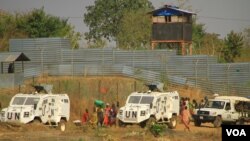United Nations officials, including Secretary-General Ban Ki-Moon, are warning of possible genocide in South Sudan as terrible violence rages there. The Secretary-General is urging the Security Council to impose an arms embargo on the country to remove the tools to escalate violence – a position the United States supports, in addition to establishing targeted sanctions on individuals responsible for some of the worst atrocities in the conflict.
South Sudan gained its independence from Sudan In 2011. In 2013 a civil war broke out and the country descended into sectarian violence, when forces loyal to President Salva Kiir, a member of the Dinka ethnic community, began to fight those who supported former Vice-President Riek Machar, an ethnic Nuer. A peace accord was signed in 2015, but the fighting has continued leading to a humanitarian disaster, with widespread displacement and food insecurity, as well as pervasive human rights abuses, including the systematic use of sexual violence as a weapon of war.
In a statement, U.S. State Department Spokesperson John Kirby said that both the government and the opposition are responsible “for the horrific violence that has brought so much suffering to innocent civilians.” He pointed to the recent mobilization of 4,000 government-affiliated militia in Central Equatoria and to repeated calls from opposition leaders to overthrow the government and attack the capital. “Both the government and opposition,” Mr. Kirby said, “continue to obstruct humanitarian access and impede the operation of the UN Mission in South Sudan, or UNMISS, and despite pledges to do so, the government has not taken sufficient steps to allow deployment of an UNMISS regional protection force to provide stability and security in Juba.”
Mr. Kirby took note of President Kiir’s December 14 call for a national dialogue, and called on both sides “to create the conditions that would be required for such a dialogue to proceed. This means that both sides must cease violence against civilians, support humanitarian access, and respect the cease fire.”
Mr. Kirby urged the swift adoption by the UN Security Council of an arms embargo and targeted sanctions “against those who have undermined peace and stability and created the conditions for mass civilian atrocities. As we and our partners in the international community continue to pursue these measures, we will support those engaging in a peaceful and inclusive dialogue as a means to resolve the current crisis and work toward the peaceful future that the people of South Sudan deserve.”












